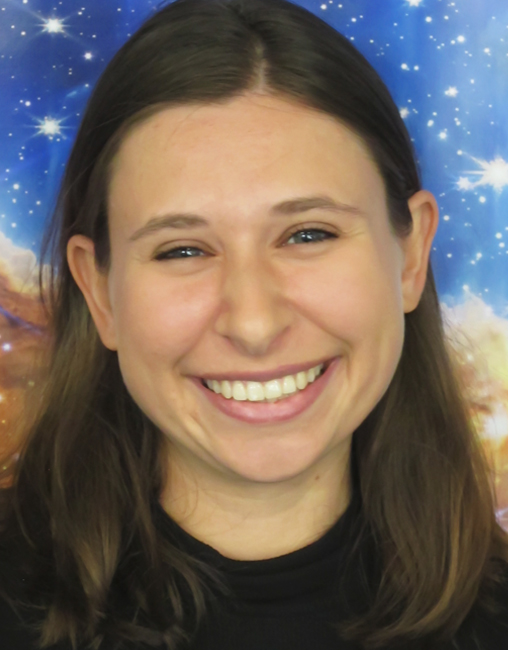Scientific Interests
Supernova cosmology, transient astronomy, strong lensing, dark matter, dark energy, microlensing, large-scale surveys
Education
Institute of Astronomy and Lucy Cavendish College, University of Cambridge, Cambridge UK
October 2022 - present
Ph.D. in Astronomy
Supervisor: Suhail Dhawan
University of Pennsylvania, Philadelphia PA
August 2018 - May 2022
M.S. in Physics
Supervisor: Prof. Masao Sako
Thesis: Classifying Transients and Variable Objects in Data from the Photometric LSST Astronomical Time-Series Classification Challenge
B.A. in Physics, Summa Cum Laude
Honors, Awards, and Skills
Finalist, Astrostatistics Student Paper Competition (Astrostatistics Interest Group of the American Statistical Association, 2024; $100)
Gates-Cambridge Scholarship (2022-present; £60,000 annually)
William E. Stephens Memorial Prize (Department of Physics and Astronomy, University of Pennsylvania, 2022; $100)
Phi Beta Kappa National Honor Society (Delta Chapter, 2022)
Trustees Council of Penn Women’s Student Leadership Award (University of Pennsylvania, 2022)
Stephen Goff Award for Student Performing Arts (University of Pennsylvania, 2022)
Roy and Diana Vagelos Challenge Award (2021- 2022; $70,000)
Roy and Diana Vagelos Science Scholar (2018- 2022; $20,000)
Skilled in Python, HTML, CSS, Javascript; Adobe Photoshop, Illustrator, InDesign, PremierPro
Select Posters and Presentations
“GausSN: Bayesian Time Delay Estimation from Strongly Lensed Supernovae” (Invited Talk), Erin Hayes, Stephen Thorp, Kaisey Mandel, Nikki Arendse, Matthew Grayling, and Suhail Dhawan, Rubin-LSST Transients and Variable Stars Colloquium, Online, Mar 2024
“GausSN: Bayesian Time Delay Estimation from Strongly Lensed Supernovae” (Contributed Talk), Erin Hayes, Stephen Thorp, Kaisey Mandel, Nikki Arendse, Matthew Grayling, and Suhail Dhawan, Royal Society Theo Murphey Meeting on Multi-messenger Gravitational Lensing, Manchester, UK, Mar 2024
“GausSN: Bayesian Time Delay Estimation from Strongly Lensed Supernovae” (Presentation), Erin Hayes, Stephen Thorp, Kaisey Mandel, Nikki Arendse, Matthew Grayling, and Suhail Dhawan, IoA Wednesday Seminar, Cambridge, UK, Nov 2023
“Classifying Transients and Variable Objects Using Convolutional Neural Networks” (Poster), Erin Hayes, Helen Qu, and Masao Sako, Exploring the Transient Universe with the Nancy Grace Roman Space Telescope, Pasadena, CA, Feb 2022
“Classifying Transients and Variable Objects Using Convolutional Neural Networks” (Presentation), Erin Hayes, Helen Qu, and Masao Sako, Roy and Diana Vagelos Scholars Meeting, Philadelphia, PA, Jun 2021
“Searching for Dark Matter in the Dark Energy Survey” (Presentation), Erin Hayes and Masao Sako, Penn Physics & Astronomy Summer Academy Symposium, Philadelphia, PA, Aug 2020
“Dark Matter, Black Holes, and Microlensing” (Poster), Erin Hayes and Masao Sako, LSST Project and Community Workshop Undergraduate Enabling Science Program, Tucson, AZ, Aug 2019
Teaching
Structure and Evolution of Stars, Part II Astrophysics, University of Cambridge
Fall 2023
- Led biweekly problem sheet review sessions for five third year undergraduate students in small group setting
- Deepened students' broader interest in astronomy by connecting discussions of problem sheets to current astronomy research
- Attended teaching workshops to learn best teaching practices and improve efficacy for marking work and giving feedback
Outreach
International Women’s Day at the Institute of Astronomy
March, 2023
For International Women’s Day 2023, the IoA led two initiatives to increase awareness of women in astronomy. Firstly, the department opened its doors to over 60 Year 9 (Age 13-14) students to deepen their engagement with astronomy. Secondly, we organized a careers panel and led an unconscious bias discussion for the department to raise awareness of issues affecting women in astronomy and connect faculty, staff, and students in the department with resources to minimize bias in our workplace.
- Led coding workshop on exoplanet discovery, particularly highlighting the contributions of women to exoplanet science
- Developed teaching resources for the coding workshop, which were made publicly available at: https://github.com/erinhay/outreach
- Researched and distributed resources for reducing unconscious bias in astronomy, such as the Cite Black Women initiative and guidance for avoiding gender bias when writing reccomendation letters
REACT at the Cambridge Festival
February, 2023
The REACT program connects researchers from the University of Cambridge to students from under-resourced schools in the nearby town of Saffron Walden. The researchers give a presentation about their science and then help the students create art which visualizes the data from the presentation in a new way.
- Presented “The Fate of the Universe” talk to three groups of 20 Year 5 (Ages 9-10) students
- Answered students’ questions in large and small group settings
- Encouraged students to be creative in how to visualize the expansion of the universe through art


